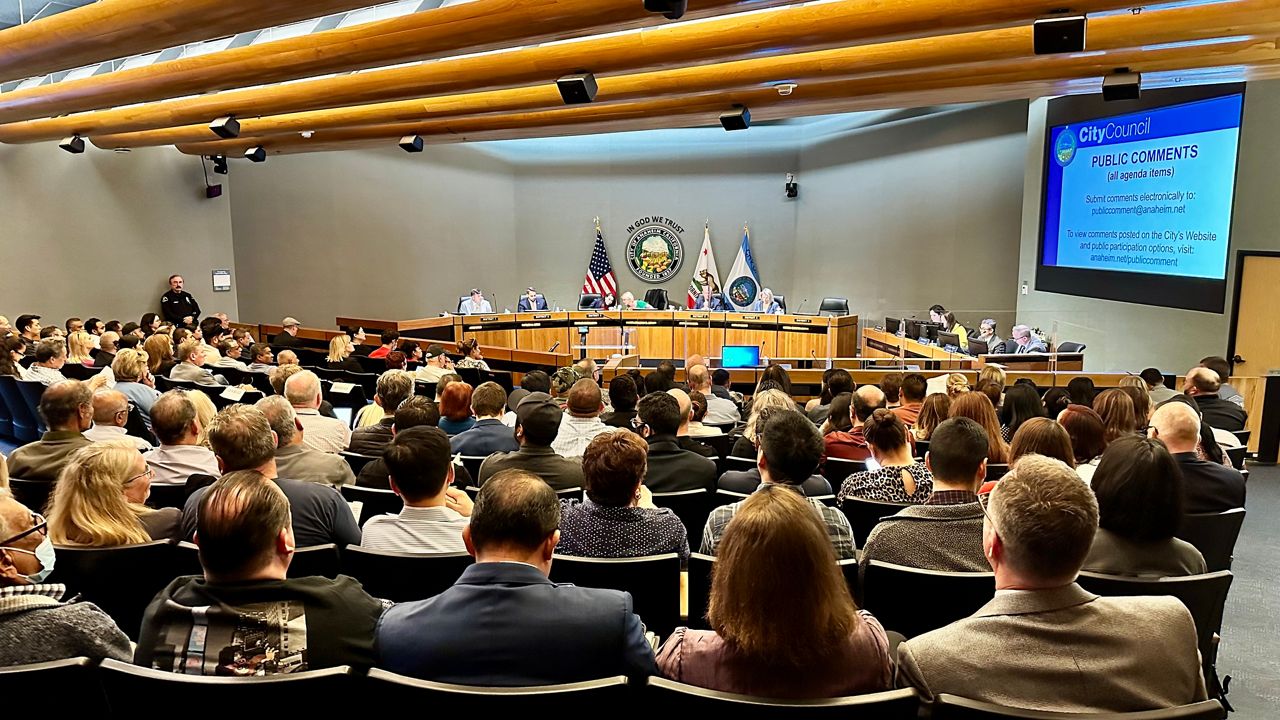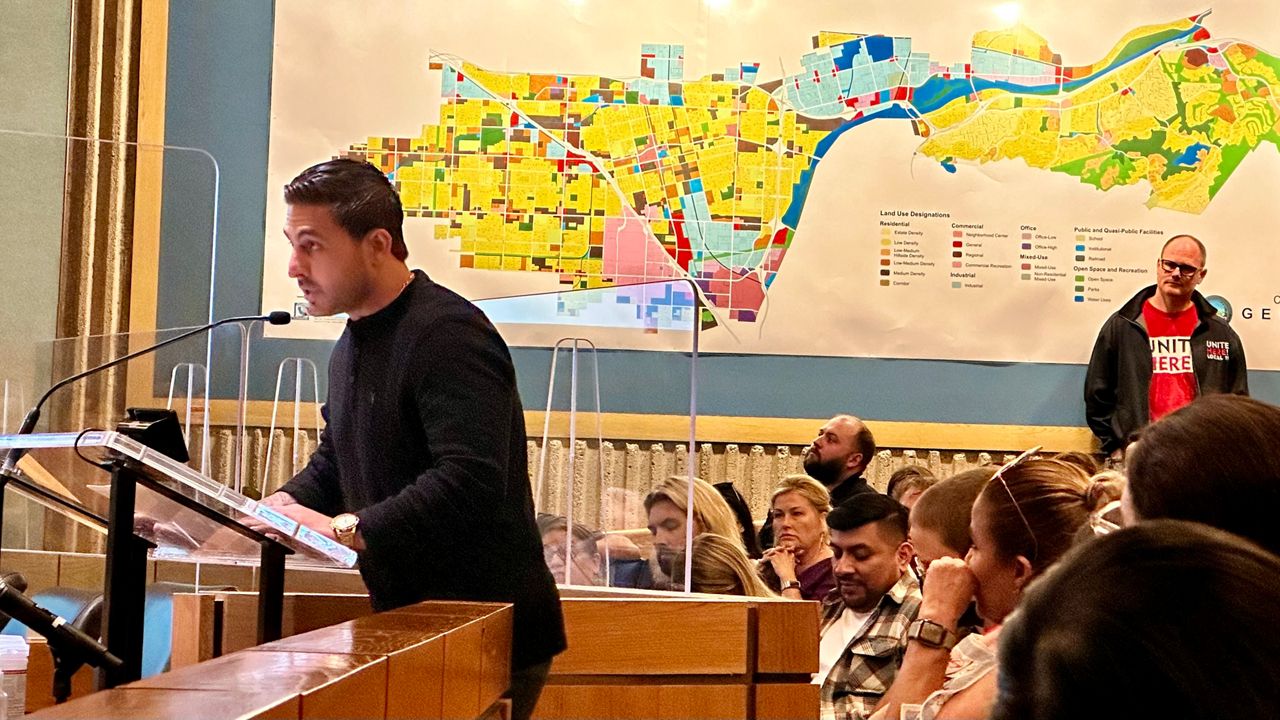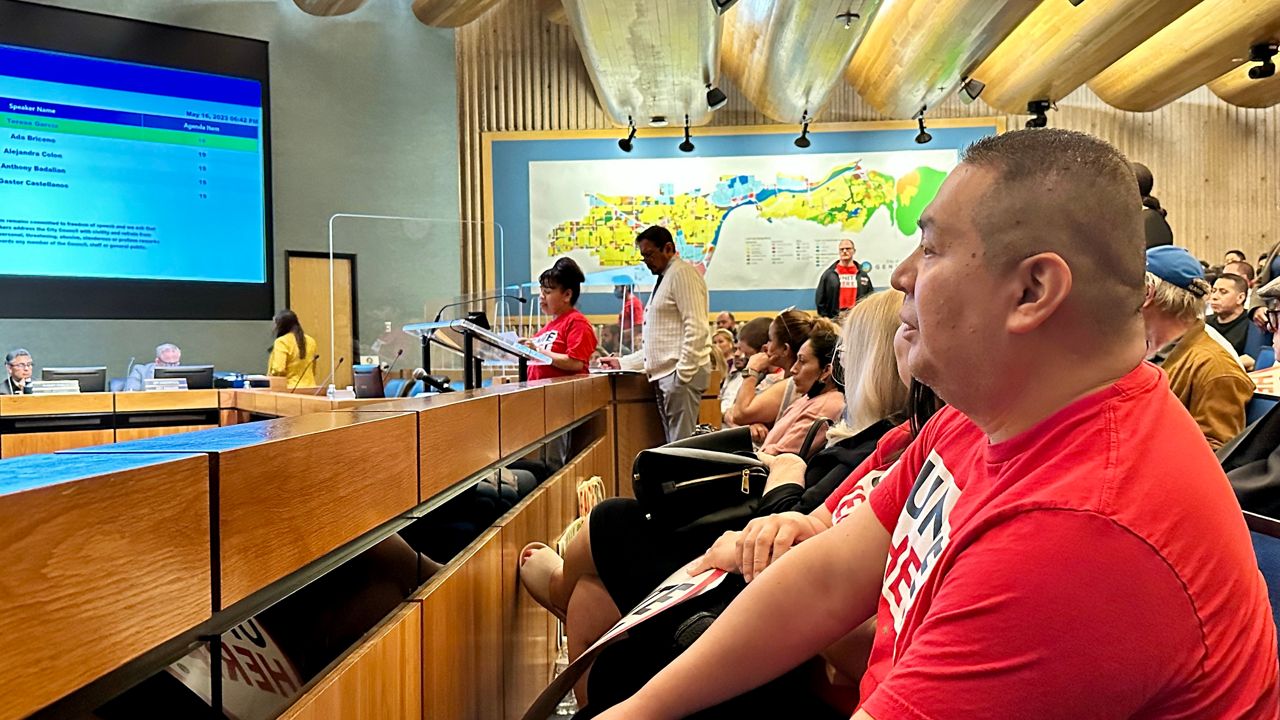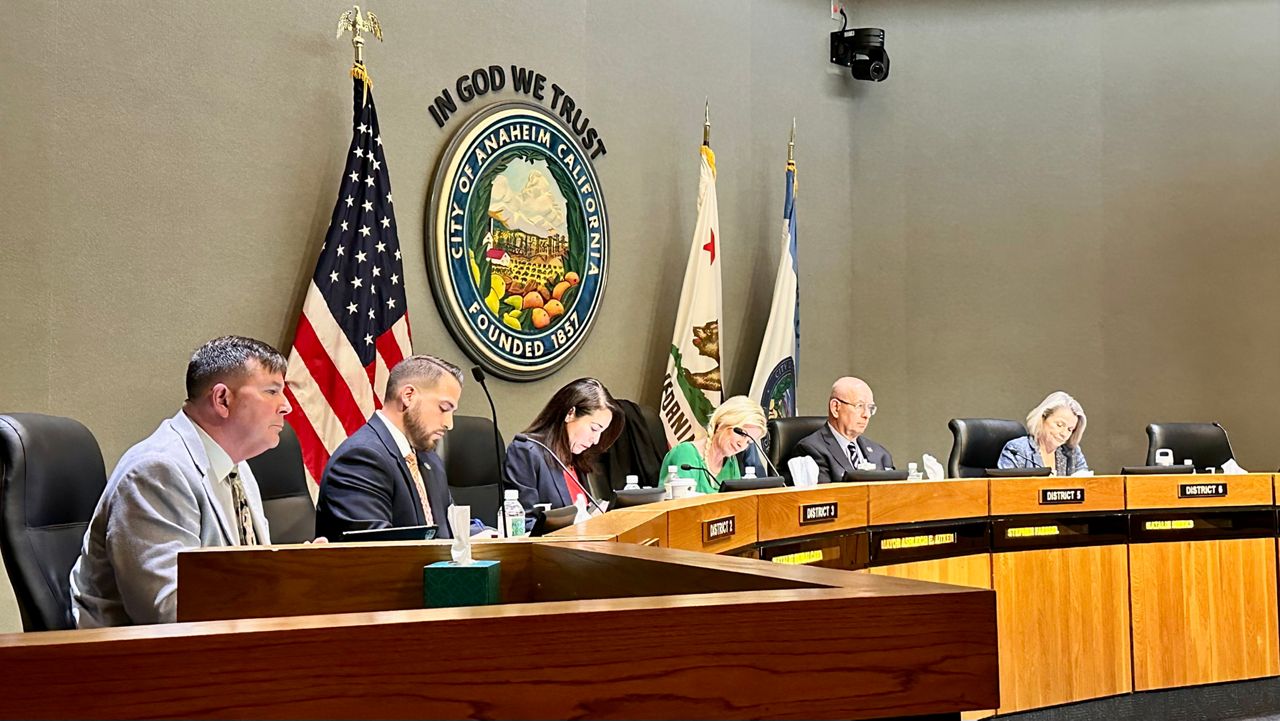ANAHEIM, Calif. — One by one, hotel owners along the city's resort district told the Anaheim City Council how a $25-per-hour worker wage hike could cripple their business and drive people wanting to visit Disneyland away from the city.
Meanwhile, hotel workers told stories of low pay, guest harassment and driving long hours to and from work because they couldn't afford a place locally.
But after more than three hours of spirited public comment from both sides, the Anaheim City Council decided the issue required further studying.

Late Tuesday night, the seven-member Council voted unanimously to conduct an economic impact study on a proposed ordinance requiring hotel and event center businesses to pay their workers $25 an hour.
Currently, Anaheim hotels pay room attendants about $17 an hour.
Many Council members expressed concern about how hiking wages — as much as 47% — would significantly impact the city budget and the resort hotels, which comprise most of the city's general fund.
Anaheim collects 15% of bed taxes from the city's 152 hotels totaling 20,000 rooms. The revenue, about $167 million, supports police, fire, parks, libraries, streets and community services.
The city also has a personal stake in the proposed initiative, given that it would mean raising workers' wages in city-owned event centers such as the Anaheim Convention Center, Honda Center, Angel Stadium and City National Grove.
Councilman Jose Diaz said he couldn't fully support raising wages without fully understanding "the unintended consequences of this."
"I need to understand what this is going to do to the police, what it's going to do to city funding, what it's going to do to the library," said Diaz. "I cannot consciously vote for something if I don't understand the long unintended consequences."
City staff will hire an outside consulting firm and have three weeks to compile an economic impact report before bringing the so-called "Hotel and Event Center Minimum Wage, Worker Retention, and Hotel Worker Safety and Workload Initiative" back to the City Council's table on June 13.
The Council also asked staff to write an ordinance to address hotel worker safety without the wage component for consideration at the next meeting.
The initiative, led by hospitality union Unite Here Local 11, which gathered 26,000 signatures from Anaheim voters, would require more than the 152 Anaheim hotels, motels and event centers, including the convention centers, concert halls, stadiums and sports arenas, to pay their workers a minimum wage starting at $25 an hour, plus annual raises and other service charges.
It also calls for greater worker protections, such as providing panic buttons for room attendants, keeping workers a certain amount after an ownership change, overtime pay and prohibiting mandatory overtime.

More than 75 hotel business owners and their supporters arrived early Tuesday, filling the Council chambers to speak out against the proposal.
Grand Legacy Hotel owner Brandon Garr said the initiative would triple housekeeping costs, which could cripple his business.
"It is financially unsustainable," he said. Garr's family has owned the hotel for nearly 50 years.
Alpine Inn owner Judy Pao said it would create a lose-lose situation for the city, workers, customers and the hotel.
The increase in labor cost would lead to higher room rates during an uncertain economic time when people are watching their wallets and looking for the best deals, she said.
She fears potential customers will be sticker-shocked by the hotel prices in Anaheim and stay at more affordable locations in Garden Grove or other nearby cities.
"Anaheim would lose its competitiveness, leading to reduced revenue and a smaller workforce," she said. "Less tax revenue means [fewer] services for Anaheim residents."
The initiative, she said, could also reduce their staff's working hours, benefits or lead to layoffs.
As hoteliers spoke about the initiative's impacts inside the chambers, many hotel workers stood and waited outside, some having finished their work shift and dressed in light blue hotel uniforms. There were chants of "sí se puede" (yes, we can), a rallying cry commonly heard in protests.
Many spoke about driving or taking public transportation for long hours because they could not afford to live in Anaheim on their salaries.
Maria Uceva, a housekeeping supervisor at the Hilton Anaheim, said many of her colleagues are on the verge of eviction.
"Rent has gone up, food has gone up, gas prices have not gone down, the economy is not doing well, and salaries have the stayed the same," said Uceva to Spectrum News.
Uceva said they must go to the City Council because "owners won't [increase wages] unless the city passes it." She added other cities such as Irvine, Long Beach, Los Angeles and West Hollywood have adopted similar protections.

Teresa Garcia, a housekeeper at the Sheraton Park, said every day is a struggle to survive.
Unite Here Local 11 co-president Ada Briceño said the workers are the "economic engine" of the city.
Mayor Ashleigh Aitken and Councilman Carlos Leon supported passing the wage hike and worker protections but were voted down by the rest of their colleagues.
Aitken said she received more than 1,400 emails from people on both sides of the issue leading up to the meeting.
She was moved by the plight of the workers, many of whom "can't afford to spend one night in the hotels they have been cleaning for over 20 years."
She said there's a "moral obligation to protect the workers."
"There's really something wrong with the system," said Aitken. "These are some of the hardest jobs we have in the city of Anaheim. We [have] a mostly female, mostly elderly, mostly immigrant women of color in these job industries, and I've been waiting, waiting for decades, for the market to correct it. And we see that is not happening."
The rest of her colleagues, however, said the issue needs further studying, not just for the workers but all Anaheim residents.
"It would be hard for me to make a decision without knowing how it affects our city budget," said Council member Norma Campos Kurtz. "And within our city budget, would we lose money for parks, my beloved senior services [and] the expansion of neighborhood services? There have to be some considerations given to that. I feel very strongly that I have a fiduciary duty to the residents of Anaheim."
Briceño, the union representative, disagreed with the Council's decision and is waiting for voters to decide.
"If they want an economic impact report, just look at our members' bank accounts, their crowded living situations," said Briceño to Spectrum News after the meeting. "That's their economic reality."



